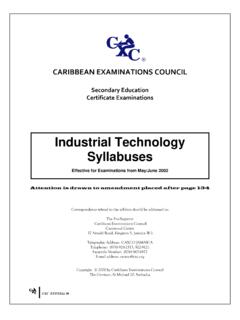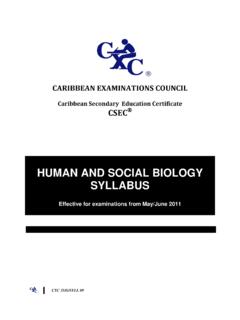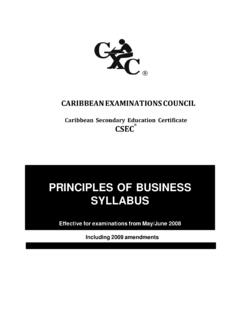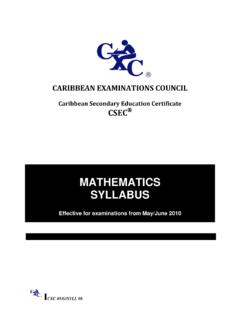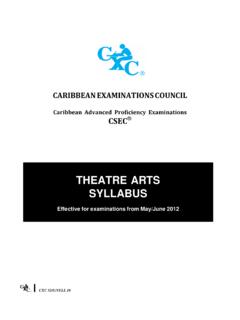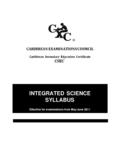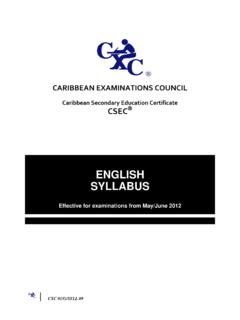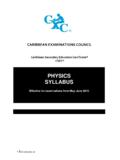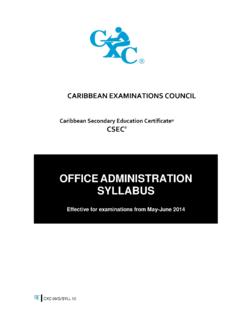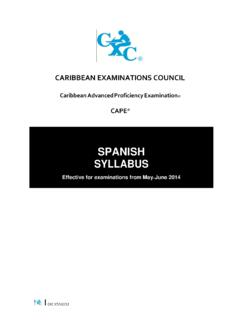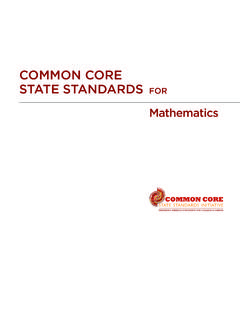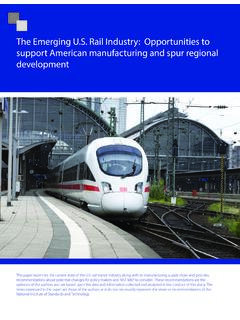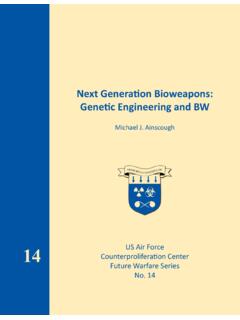Transcription of Food and Nutrition - CXC | Education
1 CXC A26/U2/04 CARIBBEAN EXAMINATIONS COUNCIL Caribbean Advanced Proficiency Examinations CAPE FOOD AND NUTRITI ON SYLLABUS Effective fo r examinations from May/June 2005 Including 2010 amendments Published by the Caribbean Examinations Council All rights reserved. No part of this publication may be re pr oduced, stored in a retrieval system, or transmitted in any form, or by any means electronic, photocopying, recording or otherwise without prior permission of the aut hor or publisher. Correspondence related to the syllabus should be addressed to: The Pro- Registrar Caribbean Examinations Council Caenwood Centre 37 Arnold Road, Kingston 5, Jamaica, Telephone: (876) 630-5200 Facsimile Number: (876) 967- 4972 E-mail address: cxc Website: Copyright 2004 by Caribbean Examinations Council The Garrison, St Michael BB14038, Barba dos CXC A26/U2/04 Contents RATIONALE.
2 1 AIMS .. 2 SKILLS AND ABILITIES TO BE ASSESSED .. 2 - 3 PRE-REQUISITES OF THE SYLLABUS .. 4 STRUCTURE OF THE SYLLABUS .. 4 UNIT 1: FOOD, Nutrition AND HEALTH MODULE 1: PRINCIPLES OF Nutrition AND HEALTH .. 5 - 9 MODULE 2: FOOD SELECTION AND MEAL PLANNING .. 10 - 14 MODULE 3: FOOD PREPARATION AND SERVICE: PRINCIPLES AND METHODS .. 15 - 19 UNIT 2: FOOD technology MODULE 1: CARIBBEAN FOODWAYS AND FOOD SYSTEMS .. 20 - 24 MODULE 2: FOOD SCIENCE AND technology .. 25 - 28 MODULE 3: FOOD PREPARATION AND SERVICE: LARGE QUANTITY AND COMMERCIAL .. 29 - 34 OUTLINE OF ASS ESS MENT .. 35 - 41 REGULATIONS FOR PRIVATE CANDIDATES.
3 42 REGULATIONS FOR RE-SIT CANDIDATES .. 42 ASS ESS MENT GRID .. 42 MINIMUM EQUIPMENT LIST .. 43 - 44 GLOSSARY .. 45 48 CXC A26/U2/04 CXC A26/U2/04 T T Introduction he Caribbean Advanced Proficiency Examination (CAPE) is designed to pr ovide certification of the academic, vocational and technical achieve ment of students in the Caribbean who, having completed a minimum of five years of secondary Education , wish to further their studies. The examinati ons address the skills and knowledge acquired by students under a flexibl e and articulated system where subjects are organised in 1-Unit or 2- Unit courses with each Unit containing three Modules.
4 Subjects exa mined under CAPE may be studied concurrently or singly. The Caribbean Examinatio ns Council offers three types of certificatio n. The first is the award of a certificate showing each CAPE Unit completed. The second is the CAPE diploma, awarded to candidates who have satisfactorily completed at least six Units, including Caribbean Stu dies. The third is the CAPE Associate Degree, awarded for the satisfactory completion of a prescribed cluster of seven CAPE Units including Caribbean Studies and Communication Studies. For the CAPE diploma and the CAPE Ass ociate Degree, candidates must complete the cluster of required Units within a maximum period of fi ve years.
5 Recognized educ atio nal institutions presenti ng candidates for CAPE Associate Degree in one of the nine categories must, on registering these candidates at the start of the qualifying year, have them confirm in the required form, the Associate Degree they wish to be awarded. Candidates will not be awarded any possible alternatives for which they did not apply. CXC A26/U2/04 T Food and Nutrition Syll abus RATI ONALE In the lig ht of increasing Nutrition -related illnesses in the worl d, it is necessary to find new ways to empower indivi duals and communities to exercise control over their health.
6 Proper Nutrition practices hold the key to the prevention and treatment of the chro nic degenerative diseases that affect families globally. It is now well establis hed that the achievement and maintenance of optimal physical and mental health, and the prevention of disease, are integral to the economic and social development of the pe ople of the Caribbean Region. The integration of preventive and therapeutic Nutrition into contemporary health care and food producti on and service is pivotal to this process. Food and Nutrition involves the st udy of food and its relation to health.
7 The pri mary focus of the subject is the raising of standards in food science, food pre paration and service. This syllabus in Food and Nutrition is designed to pre pare st udents for employment in the ra pidly growing hospitality service industry. The syllabus also seeks to change attitudes and to improve the health status of both the indivi dual and the community. In additi on, the syllabus seeks to provi de additi onal opportunity for access to, and adva nced standing in existing tertiary level Education programmes. Students will be exposed to the main aspects of food science, including safety practices, standards, purc hasing, planning, pre paring, st ori ng and serving.
8 The syllabus also contributes to the development of selected attributes from the CARICOM Ideal Person document as articulated by the CARICOM Heads of Government. This person is one who demonstrates emotional security with a high level of self-confidence and self-esteem, is aware of the importance of living in harmony with the environment and nurtures its development in the economic and entrepreneurial spheres in all other areas of life (CARICOM Education Strategy, 2000). This holistic development of students aligns with selected competencies advocated in the UNESCO Pillars of learning. These are learning to be, learning to do, and learning to transform one s self and society.
9 Students who complete this programme in Food and Nutrition will be beneficiaries of knowledge and skills that would help them to secure good health and well-being for themselves and their families. Such knowledge and skills, once acquired, would allow graduates to enter the world of work and be better prepared to purs ue a wide ra nge of contemporary careers related to diet, fit ness and well-being. CXC A26/U2/04 1 AIMS The syllabus aims to: 1. promote an understanding of the cultural, environmental, socio-economic and other factors that influence Food and Nutrition practices in the Caribbean; 2.
10 Develop Food and Nutrition related skills and attitudes which will enhance the quality of life of peoples in the Caribbean; 3. enable the making of informed choices regarding food consumption and physical activity patterns that contribute to optimal health, and prevention of disease; 4. pre pare st udents to take adva ntage of various career opport unities in the field of Food and Nutrition . SKILLS AND ABILITIES TO BE ASSESSED The skills students are expected to develop on completion of this syllabus, have been grouped under three headings: (i) Knowledge and Compre hension; (ii) Use of Knowledge; (iii) Practical and Experimental Skills.
